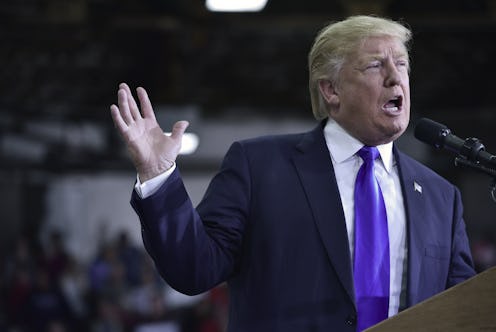News
Did Someone Really Try To Assassinate Trump?
During a rally in Reno, Nevada, on Saturday night, Republican presidential candidate Donald Trump was rushed off the stage by members of his U.S. Secret Service team. The candidate returned a short while later to finish his speech, while an audience member was reportedly removed from the crowd. In the wake of the event, some Trump supporters are calling the incident an "assassination attempt," but that explanation doesn't seem to tell the whole story.
According to The New York Times, the incident began when Trump noticed a bit of commotion in the audience of his rally. He pointed out a particular audience member, labeling the individual as a paid surrogate of Hillary Clinton. Shortly thereafter, someone in the audience reportedly yelled, "Gun!" As a result, the Secret Service rushed Trump offstage and apprehended the individual in the audience who was thought to have a weapon.
Sure, if someone yells, "Gun!" in a room full of people at a political rally, it's not a far jump to think of the incident as an assassination attempt. In this case, though, the details reported after the incident don't seem to add up to an assassination attempt at all. On the contrary, they point to a nonviolent — if disruptive — episode.
Here's a recap of what we know about the incident, as of early Sunday morning: Trump was rushed offstage, only to return a few minutes later. A man was removed from the audience of the Reno rally on suspicions that he had a weapon. According to the Secret Service, though, no weapon was found. Nonetheless, Donald Trump, Jr. and other individuals close to the Trump campaign retweeted news that the Donald had successfully foiled an "assassination attempt." They also called on social media for an end to "Democrat violence."
According to various media and social media reports, the man who was removed from the rally audience identified himself as Austyn Crites on Facebook. In a Facebook post, Crites told the public that he was "beat up at a Trump rally for holding a sign" and "falsely accused of having a gun." He also denied any sort of connection with the Clinton campaign, which Trump had insinuated. Instead, he called himself a Republican who "cannot support Trump and his decisive rhetoric."
Ultimately, it remained unclear several hours after the incident exactly what happened in Reno. No matter what happened, though, the absence of a weapon and the story of the self-identified disrupter did not align with Trump supporters' reports of an assassination attempt. Rather, the incident seemed to be another instance of an increasingly disgruntled and fragmented Republican party.
